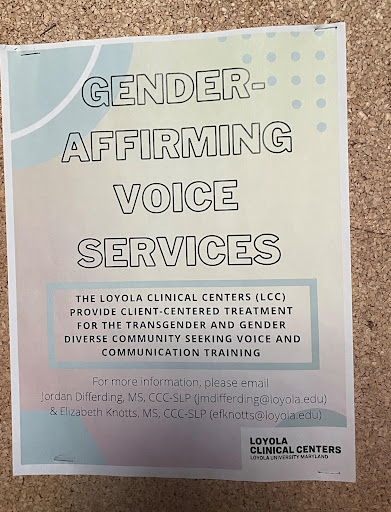According to CNN, new laws have been enacted restricting gender-affirming care for minors across the country in states like West Virginia, Utah, and South Dakota. Associate Director for Programs at Loyola’s Center for Community, Service, and Justice Pat Cassidy, who also serves as club moderator for the LGBTQ+ Experience, says this enactment of laws is targeting transgender youth and families by limiting access to safe and monitored care.
Cassidy said research has shown that gender-affirming care is supportive of trans youth and there is a lot of research on the harm that occurs when youth and families don’t have access to that care.
“It is incredibly disheartening because of the fact of the impact it has on youth across our country, particularly in Utah and West Virginia. It impacts families and youth’s ability to make decisions around their own health and access to health,” said Cassidy.
The politicization of gender identity impacts trans and non-binary youth by instilling these systemic barriers that continue to marginalize the queer community. Cassidy says that these political debates remove the real people who are affected by these laws.
“It removes the humanity within the experience. It becomes tied to a particular argument or political party or an ideal, versus the actual humans and people who are impacted day in and day out. There are people whose lives we are talking about or arguing about when it comes to laws,” Cassidy said.
Loyola has made strides to promote security and inclusivity amongst the Loyola community, but LGBTQ+ Services Coordinator Sunny Swift says there is room for improvement. He said ideas should go beyond benefitting the student body, and also bring in the entire Loyola community.
Swift said, “I would definitely include trans-affirming healthcare in staff, faculty, and administration insurance packages. I think that it is included in student packages, but not in staff, faculty and administration. I would also say more education for faculty members and having an LGBTQ+ center.”
Cassidy said that Loyola has taken steps such as all-gender housing, the chosen name policy, and a new initiative through the Loyola Clinical Center that provides gender-affirming care within voice work and therapy, but there is always work to be done. The technology needs to be up to speed to support trans and nonbinary students fully.
“Similarly with technology, we have a long way to go in terms of being able to collect and utilize pronouns in terms of class rosters, and all of that,” Cassidy said.
“I think we do a great deal of disservice to students within the classroom experience and there is a great deal of deadnaming and misgendering of students that happens within the classroom that causes a great deal of stress, anxiety, and lack of safety for students within the classroom which impacts student learning and their learning experience,” said Cassidy.
Loyola offers many resources that supply support and affirmation for the student body, especially those coming from marginalized communities. Swift says that the resources and centers across campus need to continue to be acknowledged and celebrated for their work.
“We are doing an LGBTQ+ Resource Fair, so that is one example. The Counseling Center is hosting that, and I am spearheading it. We have a list of a number of resources that specifically help trans and nonbinary folks: ALANA Services, the Career Center, Counseling Center, CCSJ, the Office of Equity and Inclusion, Campus Ministry, the Health Center, Women’s Center, and student groups such as LGBTQ+ Experience and Spectrum,” Swift said.
As a Catholic Jesuit institution, one of the values the institution upholds is “cura personalis,” which means care for the whole person. Cassidy says that we need to honor and respect everyone who crosses our path.
“All of the injustices are rooted in a fear of the other, and I think as a university rooted in the Catholic Jesuit tradition to understand, appreciate, and acknowledge the fullness of who we are as created individuals. I think we are called to look at, honor, respect, and love each other’s fullness,” Cassidy said.
Featured Image Courtesy of Samantha Jones.







































































































